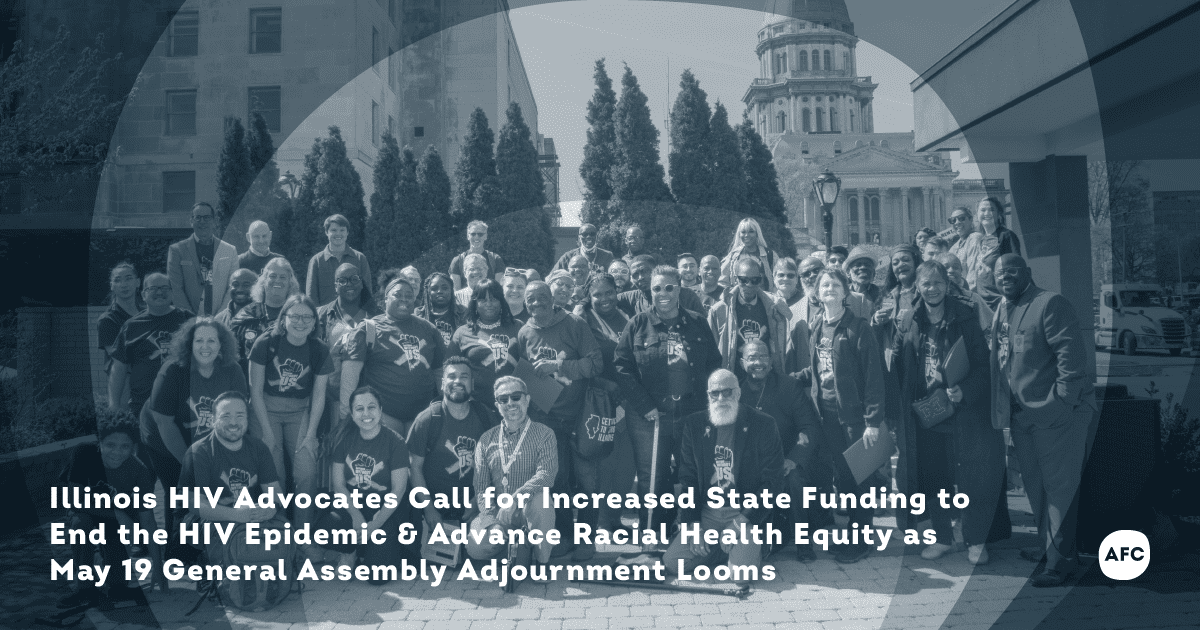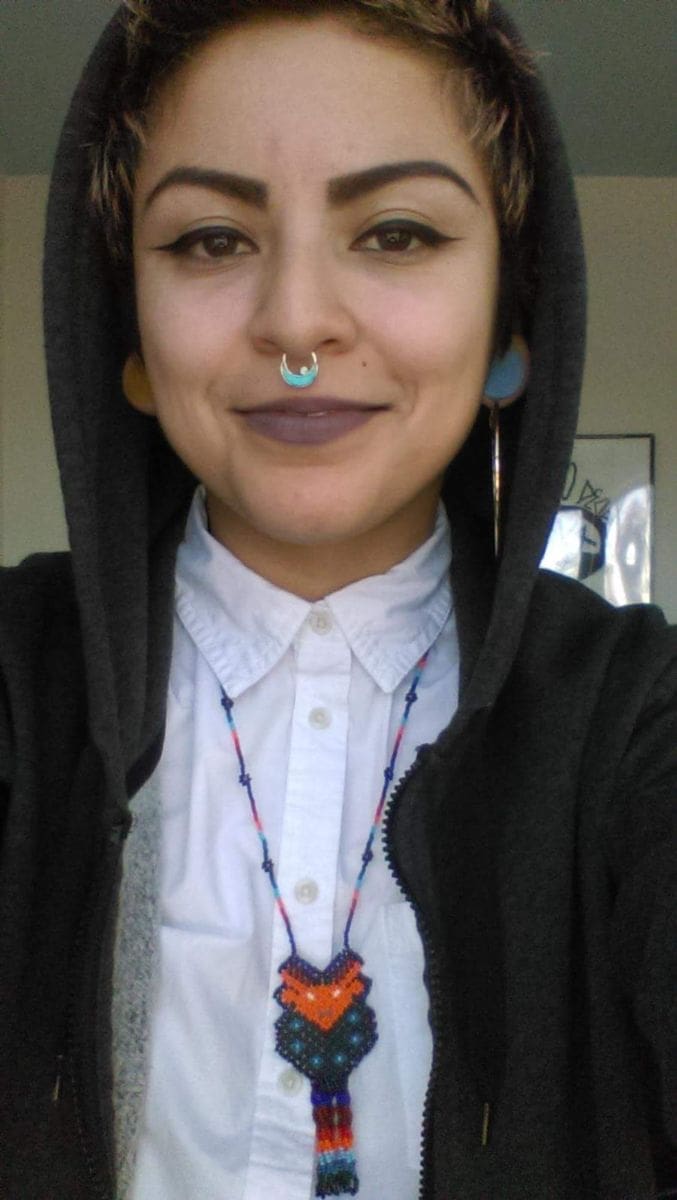
As the Illinois General Assembly enters the final weeks of the 2023 spring legislative session, AIDS Foundation Chicago (AFC) urges legislators to include additional funding in the state’s Fiscal Year 2024 budget that will advance the state’s goal of ending the HIV epidemic by 2030.
In total, advocates are calling for legislators to appropriate an additional $8 million to the current allocation of state funding of $50.5 million. Advocates are proposing:
- $2 million increase to the state’s primary HIV funding account to support increased need for HIV medications through the AIDS Drug Assistance Program
- $15 million for the African American HIV/AIDS Response Fund (level funding)
- $10 million for the Getting to Zero Illinois Initiative (level funding; the Governor proposed a 50% cut to this budget line item)
- $5 million increase for the PrEP4Illinois program. PrEP is an HIV prevention medication that is up to 99% effective at preventing new HIV cases, but too few people from the populations most vulnerable to HIV are taking PrEP
- $1 million in new state funding to address the increased rates of sexually transmitted infections in Illinois
These funding amounts are included in HB 1349 (Rep. Lakesia Collins, D-Chicago) and SB 209 (Sen. Mike Simmons, D-Chicago). AFC thanks Rep. Collins and Sen. Simmons for their unwavering leadership of this funding request. Please send a message to your legislator asking them to support the funding request here.
“The goal of ending the HIV epidemic by 2030 is just seven years away,” said Nadeen Israel, AFC’s Vice President of Policy & Advocacy. “We were disappointed that Governor Pritzker proposed a 50% cut to the state’s $10 million Getting to Zero Illinois budget line, which was first appropriated last year. Legislators must restore this funding cut in this year’s state budget.”
People living with and newly diagnosed with HIV in Illinois are vastly disproportionately Black and Latinx. Over 52% of people newly diagnosed with HIV are Black, despite only representing 14.7% of the state’s population. Latinx people are 18% of the state’s population but 21.4% of people newly diagnosed with HIV, according to AIDSVu.org.
“Despite the effects of COVID-19, we’ve been able to make progress in ending the HIV epidemic in Illinois. However, HIV continues to disparately impact Black, Latinx and LGBTQ+ communities,” said Timothy S. Jackson, Director of Government Relations at AFC. “Investing in HIV care and prevention services is the right thing to do and ultimately saves the taxpayers of Illinois valuable money and resources. Prioritizing these needed investments will allow HIV providers to reach the communities that have too often been left out and left behind.”
“Without question, HIV is a racial health justice issue,” continued Jackson. “New HIV diagnoses among Black and Latinx people are driven by a number of factors including stigma, lack of access to care, and racist systems and policies. The funding we are calling for can serve as an antidote to these racist policies, by for example, helping people living with HIV find stable housing.”
AFC Details Racial Equity Funding Analysis
AIDS Foundation Chicago (AFC) understands that meaningfully addressing racial equity in HIV shouldn’t only be limited to government. AFC has publicly committed to improving racial equity through our Racial Equity Action Plan, which details specific steps AFC is taking to change policy, strengthen programs and internally transform the organizational.
A critical approach to improving racial equity as outlined in our plan is benchmarking and then working to increase the amount of funding AFC grants to Black-led organizations. In 2022, AFC and our subsidiary Center for Housing and Health (CHH), provided $2.9 million to 19 Black-led organizations, or 20% of our grants and contracts to community partners. AFC and CHH support 19 of the estimated 25 Black-led organizations engaged in HIV work in the state of Illinois.
AFC performed a detailed analysis of the government funding it receives to support people living with HIV across the Chicago area. AFC holds contracts with the Chicago Department of Public Health (CDPH) and Illinois Departments of Public Health (IDPH) for HIV care, housing, and prevention services. As lead agent for IDPH Regions 7 and 8, as well as the coordinating entity for the Northeastern HIV Case Management Collaborative, AFC is responsible for training, data management, evaluation, reporting, and overall coordination of services. Funding sources include the federal government, City of Chicago, and a small amount of state general revenue funds. In 2023-2024:
- AFC expects to provide over $564,034 in CDPH funds to five Black-led organizations. That represents 13% of funding that AFC provides to subcontractors. AFC increased this amount by 15% and added one new organization in FY23.
- AFC expects to provide $888,976 in IDPH funds to nine Black-led organizations. This total represents 13% of funding that AFC provides to subcontractors. AFC increased this amount by 68% and added three new organizations in FY23.
In total, AFC expects to provide over $1.43 million to Black-led organizations from IDPH and CDPH funding in FY23. AFC recognizes that this is not enough and is committed to increasing funds for Black-led organizations by at least 10% in FY 23 and continuing to support and provide capacity-building and technical assistance to Black-led organizations. AFC awards these funds through an open and transparent process.
“Increasing funding for Black-led organizations is a key priority as AFC works to close racial health gaps in HIV and ultimately end the HIV epidemic,” said John Peller, President & CEO of AFC. “Black-led organizations are vital to reaching people living with and vulnerable to HIV and have an extraordinary power to provide a leading role in ending the HIV epidemic here in Illinois and across the nation.”
With community as the North Star, AIDS Foundation Chicago calls upon Governor Pritzker, IDPH and the General Assembly to center the communities most impacted by HIV by directing more funding and resources to Black-led and Latinx-led community-based organizations. Doing so will expand equity and ensure that Illinois addresses the harmful impact of HIV in our communities and invests in ending the HIV epidemic.


